Feed aggregator
Immerse Yourself in 12 Influential Short Story Novels That Epitomize the Form
Are you ready to read a collection of short stories that reads like a novel?…
The post Immerse Yourself in 12 Influential Short Story Novels That Epitomize the Form appeared first on LitStack.
THE FRUGAL WIZARD’S HANDBOOK FOR SURVIVING MEDIEVAL ENGLAND by Brandon Sanderson
Comment on Busy by Bill
Glad that the words are flowing on Book#4, that must be your priority and better not to do world-building side-tracks while the muse is upon you!
Good Luck/writing!
Looking forward to those articles when you have the time!
(Don’t writers get holidays like us mortals too?)
The Inheritance: Chapter 7 Part 1
Mod R is taking time off, so I’m moderating. I know she sometimes explains why a comment was pulled. I don’t have time, unfortunately, so if your comment disappears, it was probably really off topic or it might have gotten flagged as spam.

Elias studied London from across the conference table. The man was lean, in good shape, with an expensive haircut and the kind of face most people would describe as attractive. He seemed ten years younger than his forty-five, and the way he sat, although not overtly confrontational, signaled that he was neither nervous nor afraid.
It was that easy confidence, coupled with innate ability, that first prompted Elias to promote London to leader of Assault Team 4 five years ago. People looked at London, saw that he wasn’t frightened, and trusted him to take them into the breach and bring them safely out. London appeared capable and stable, and in practice and training matches he outperformed most of the other higher tier Talents. A perfect candidate to lead an assault team.
He saw London differently now. What he’d previously mistaken for confidence was instead an ever-present air of polite entitlement. London lost most of his team, people who counted on him to keep them from harm, and he had escaped uninjured. Most guild members in that position would be sweating bullets right now. Not London.
He held himself as if this was a meeting of equals instead of a subordinate who’d made a major mistake and his boss who was not inclined to let it pass. He wasn’t impatient – that would’ve been impolite and London was never impolite. Rather he managed to make it clear that he considered this entire process a formality, a series of tedious procedural steps, at the end of which he would be released with all his troubles swept under the rug and forgotten.
On paper, he and London were not dissimilar. Both blade wardens, both in their mid to late 40’s, both with nearly a decade of gate diving. At one point, years ago, the gap between their abilities had been much shorter.
Elias had grown in power every year. Nine years after his awakening, he was stronger, faster, and more experienced than when he had started. He learned to imbue his blade, so his weapons cut through solid steel and stone. His shield lasted a full five seconds longer now than it had when he’d walked into his first gate, and each second was hard won through grueling training and life and death battles.
London hadn’t progressed at nearly the same pace. It might have been the limitations of their inborn abilities, but Elias had come to suspect that it was a limitation of will. London was happy in his current position within the guild. He was well compensated for taking a relatively low risk role, he had no immediate supervisor breathing down his neck, and he rarely spent a night in the breach. Elias could see the appeal. But he also knew that he, himself, would never be satisfied with just that.
He’d thought about it while rereading London’s file. Alexander Wright came from an upper middle-class family, had gone to a boarding school, followed that with Cambridge, and ended up with a job in finance. Affluent, comfortable, respectable, just as expected. Unfortunately for Wright, the market collapse following the first gates’ bursting bankrupted the firm he’d worked for and wiped out his personal wealth. He was forced to pivot.
This struggle was short-lived, since he’d conveniently awakened to his talent. Six months later he was in the US, making a name for himself as London, moving from smaller guilds to more prominent ones, until a Cold Chaos recruiter scouted him six years ago.
That seemed to be a trend with London. He led a charmed existence. It wasn’t that he didn’t experience adversity, it was that when a crisis occurred, another opportunity always presented itself. He was expected to do well and always land on his feet and had no doubt he would.
Elias had been in a state of crisis from the moment the gates opened. It never stopped. No exit ramp appeared, and if it had, he wasn’t sure he would’ve taken it.
His grandfather was a carpenter who got drafted during WWII and served with honor. His father enlisted in the Navy to escape Vietnam, because he knew he would eventually be drafted and wanted to choose where to serve. He ended up going career, retiring 20 years later, and picking up a civilian contractor job at the Department of Defense. Elias himself had gone to Virginia Military Institute, and his big rebellion consisted of accepting a commission in the Army instead of the Navy, partially to spite his dad. He was the first college graduate and the first officer in four generations of McFernons. To him, striving for advancement was a given. You always wanted to be better, to do more, to get that next rank, to excel, and to matter.
No matter where life took them, London would always slightly look down on him. The condescension of classism was so casual, London himself likely barely registered it. Normally Elias didn’t give a fuck what London – or anyone else – thought of him, but right now he needed to remind the escort captain of their respective roles. This wasn’t a business meeting. London wasn’t doing him a favor. He was called out on the carpet and had to account for his actions. The man was entirely too comfortable, and when people felt that comfortable, lying was effortless.
Elias would’ve liked to have this conversation back at HQ instead of Elmwood Library. It would’ve set a proper tone, but he, Leo, and London needed to remain on site. The protocol dictated that if an entire assault team was lost, the gate had to be guarded at all times in case of a sudden rupture. Elias had taken a very short excursion to the HQ today, because it was absolutely necessary, but from now on he and every other guild member were gate-bound.
Library or not, Elias needed to deliver a powerful, precise punch and knock the man off balance or he would never get to the bottom of this mess.
Elias leveled a heavy stare at London. “Is this another Lansing? If it is, you need to tell me now.”
London went pale.
That’s right. Remember how you landed in your current spot. Remember why you’re no longer the assault leader.
London leaned back in his chair, his expression indignant. “How much longer? How many times do I have to prove myself? Will you ever let it go? What do I have to do?”
Too easy. “Not losing an entire escort team and most of the miners would be a good start.”
The words hung between them.
The door swung open. Leo entered the room and sat on London’s left. They had coordinated this prior to the interview.
“That’s unfair,” London said. “Nobody could have stopped that. You couldn’t have stopped that.”
“I would have tried.”
“And you would have died.”
Elias pointed to the survey of the mining site printed on a large posterboard. “Walk me through it.”
London glanced at Leo. “I already spoke to the Vice-Guildmaster.”
“And now you’re speaking to me.” Elias leveled a heavy stare at London and paused to let the weight of his words sink in.
The escort captain shifted his weight to the side, leaning to his left in the chair, and crossed his arms. If they were standing instead of sitting in the office, his shield would be up.
Elias leaned forward, taking up more of London’s view, communicating that the table between them wasn’t much of a barrier. His speech was unhurried.
“You know what’s so easy about telling the truth? It’s always the same. You don’t have to think, you don’t have to keep track of it. It never changes. Start with the moment you entered the gate. You were four minutes behind schedule. Why?”
London sighed. “Ms. Moore had an emergency phone call regarding her daughter. I judged it to be in the best interest of the guild to allow her to resolve that situation before we went in. That way she could be more fully focused on the assessing.”
Elias had spoken with Adaline’s children this morning, after he drove to HQ at sunrise. Haze had put them into the HQ’s guest apartments, and when Elias came to visit, he was greeted by two scared kids and an upset cream-colored cat. The cat hissed at him. The children wanted to know if their mother was dead. He wanted to know that too.
“What happened next?” Elias pressed.
“We entered the breach and proceeded to the mining site.” London pointed to the survey. “We walked for approximately twelve minutes. The transit was uneventful. Seven minutes in we encountered a group of deceased hostiles, which identified as a variant of Moody’s stalkers…”
The story was largely the same as the notes Elias had read: they got to the site, started mining, then five hostiles emerged from the tunnels and slaughtered everyone. According to London, he saved whom he could by collapsing the entrance. This time though, he mentioned the gold in addition to the adamantite.
“You omitted the discovery of the gold in your original interview. Why?”
“It was not relevant. I was focused on conveying the nature of the threat.”
“Fourteen people died or are presumed dead,” Elias said. “Everything is relevant.”
“I know,” the exasperation was clear in London’s voice. “I can count.”
He wasn’t completely lying, Elias reflected. His physical responses when recounting the attack matched those of someone who lived through a near death experience. Whatever happened scared the hell out of London, and that was precisely the problem.
At his side Leo sat slightly straighter. Elias kept looking straight ahead. No, not yet.
“In your opinion, was the mining site secure?”
London unlocked his teeth. “No.”
“What steps would you have taken to make the mining site secure?”
“I would have collapsed the north access tunnels.”
“Why didn’t you?”
London grimaced. “It wasn’t my call.”
And it went exactly the way Elias expected it to go. London was shifting as much of the blame on Malcolm as he could get away with, and Malcolm wasn’t here to defend himself.
Elias glanced at Leo. Now.
“Did you review the survey with Assault Team Leader Malcolm?” Leo asked.
“I did. You have a record of that meeting.”
“Did Malcolm specify how he selected the mining site?” Elias asked.
“Again, you have the record of the meeting. He selected the site based on the visible mineral deposits of malachite and copper-bearing ores in the walls, the size and relative stability of the cavern, and the proximity to the gate.”
“Were you aware of the risks the tunnels posed?” Leo asked.
“Yes.”
“Did you raise those concerns with Malcolm?” Elias asked.
“I did.”
“What rationale did Malcolm give you for leaving the tunnels intact?” Leo asked.
“He thought he might require an alternate route to the anchor.”
“Why not just collapse the tunnels and dig through if needed?” Elias asked.
“I don’t know.”
“Why didn’t you collapse the tunnels after getting to the site?” Leo asked.
London stared at him for a second. “Because it is not my call.” He bit the words off.
“The security of the mining site is your call. You are responsible for the safety of the escorts and the miners,” Elias countered. “Do you understand the scope of your duties, Escort Captain Wright?”
London glared at him. Angry red blotches colored his face.
“Malcolm wanted to keep the tunnels open. I brought up the possible risk. Malcolm reiterated his desire to keep the tunnels open. The survey showed no predators larger than the stalkers, and my team was well equipped to handle the stalkers. I requested a secondary sweep of a half mile from the entrance to the tunnels. The scout confirmed the sweep was done. You are not going to hang this on me. Malcolm fucked up. Malcolm is dead.”
It was all pouring out. They broke him.
“We can split hairs all day, but in the end, all of us in this room know that the ultimate responsibility lies with the assault leader. As the escort captain, I must maintain a good working relationship with the assault leader. That is the system that you put in place. You put Malcolm in that position, and you put me in my position.”
Shifting the blame again. If it wasn’t his fault, it was Malcolm, and if it wasn’t Malcolm, the system and the guild were to blame.
“Malcolm and I respected each other. I was not going to go behind his back, because I had to work with him in the future. I brought three people out with me, three people who otherwise would have been dead. I am not going to take the blame for what happened. This outrage and scrutiny are disingenuous. A fatal event happened; people died. People die in breaches every day. This was no different. Either get used to it or get out of the game.”
London’s brain finally caught up with his mouth. He shut up.
Nobody said anything.
“You can judge all you want,” London said. “But you weren’t there. You didn’t see them. The speed… They were so fast, they blurred. My reaction time is half that of an average human and I couldn’t follow it. Elias, seriously, whatever assault team would have been in that fucking cave, none of them would have made it. You want me to say I ran? Yeah, I did. Like I told you, I saved who I could and got out.”
Elias leaned forward. “Look me in the eye and tell me that everyone else in that cave was dead when you threw the grenade.”
“They were dead. All of them. The miners, the K-9, the scout – everyone was dead. I saw the DeBRA cut to pieces. You have my word.”
They hounded London for the next ten minutes, but they didn’t get anything else. Elias knew they wouldn’t. In the end, they told him to stay put at the site and let him go.
Elias leaned back in his chair. London was lying. It was in the eyes. That direct unblinking stare when he said, “You have my word.”
“It wasn’t the gold,” Leo muttered.
“It wasn’t.”
London’s demeanor confirmed what Elias already deduced from the record of the survey meeting. He didn’t know about the gold, and he didn’t see it as relevant.
No, this problem ran deeper.
Leo steepled his fingers, his tone methodical, almost clinical.
“Assault Team 3 is the best performing team in the yellow and orange tiers. Malcolm and London worked together frequently. London saw him as his professional equal. In his mind, they were laterally positioned. If he pushed against Malcolm, there would’ve been tension and conflict. London abhors tension. He didn’t want to rock the boat. Was it a misguided professional courtesy?”
“And professional arrogance,” Elias said. “You heard him. Nothing larger than a stalker was found. Breaches are unpredictable. Nothing can be taken for granted. He’s grown complacent.”
Leo’s eyes flashed with white. “He’s lying. I can’t prove it, but I feel it.”
“It’s the lack of guilt,” Elias told him. “You go in and lose your whole team. You’re going to be pretty fucked up. Maybe catatonic. I’ve had to put people on suicide watches before. He’s too aggressive, too confrontational. He’s absolved himself of all responsibility. He’s right about one thing – I put him into that position. The buck stops with me.”
“It’s been three years since Lansing,” Leo said. “He hasn’t fucked up until now.”
“That we know of. One of two things happened in that breach. Either London is telling the truth, and he is a hero who saved three miners, or he is a coward who abandoned his team to their death.”
“Which do you think it is?” Leo asked.
“I think he saw something that terrified him, and he bugged out. The only way to prove what happened is to examine the mining site and the bodies, assuming there is anything left of them. I need cause to remove him from his position.”
“And with Melissa backing him up, we don’t have any.” Leo frowned. “If we demote him, it will look like we made him into a scapegoat.”
“That’s not our biggest problem. If we demote him without proof, he will jump ship to Guardian or any other guild willing to take him. He looks good on paper. He will aim for the escort captain again, because he likes that job, and the next time shit hits the fan, more people will die.” Elias exhaled. “We need to get into that breach ASAP.”
“Agreed,” Leo said.
“Did you find Jackson?” Elias asked.
“Not yet. We’re doing everything we can.”
“I know.”
Sitting on his hands was driving him out of his skin, but going into that breach without a healer was suicide. Whether London lied or told the truth, something took out Malcolm’s assault team. He couldn’t risk any more lives.
“You need to rest, sir,” Leo said quietly.
Elias looked up. Outside the window the morning was in full swing. He’d slept four hours in the last forty-eight.
“We have bunks set up downstairs,” Leo said. “If anything happens, if I hear anything, I’ll wake you up.”
Elias didn’t feel like sleeping, but his body needed it, and he knew he would pass out the moment his head hit a pillow.
“Wake me up as soon as you find Jackson.”
“I will, sir.”
The post The Inheritance: Chapter 7 Part 1 first appeared on ILONA ANDREWS.
Comment on Busy by Jason Enberg
Great to hear you are able to focus on the writing.
Tor Doubles #8: Leigh Brackett’s The Nemesis from Terra and Edmond Hamilton’s Battle for the Stars
 Cover for The Nemesis from Terra by Tony Roberts
Cover for The Nemesis from Terra by Tony RobertsCover for Battle for the Stars by Bryn Barnard
This volume includes the story Nemesis from Terra by Leigh Brackett and Battle for the Stars, byt Edmond Hamilton. There are two significant distinctions for this volumes. The two authors represented were married to each other and one of the stories was previously included in the Ace Double series. The Tor Double was originally published in May 1989.
The Nemesis from Terra was originally published as “Shadow Over Mars” in Startling Stories in Fall, 1944. It was previously published as part of an Ace Double (F-123, with Robert Silverberg’s Collision Course) in 1961. The Nemesis from Terra is the first of three Brackett stories to be published in the Tor Doubles series.
Although set on Mars in the far future, as with many of Brackett’s Martian stories, The Nemesis from Terra feels more like a fantasy novel than a science fiction novel. It is a descendant of the Mars of Edgar Rice Burroughs and could easily be classified with the stories of Robert E. Howard, neither of which is a surprise.
Rick Urquhart is the main character of the novella, although to call him a protagonist gives him more agency than he really has. From the earliest pages, in which he ducks into a doorway to avoid the anthropoid Martians who are tracking him down and hears an old woman prophecy that his shadow will extend over Mars until the final pages, he is more reactive to events, whether they are forcing him into a course of action or he is attempting to avenge wrongs perpetrated on him.
His life isn’t entirely horrible. While escaping the clutches of the evil Terran Exploitation Company, run by Ed Fallon and his henchman Jaffa Storm, Rick meets Mayo McCall, and the two fall instantly in love, although there seems little reason for their affection. Rick is also the subject of Kyra’s love, a young winged Martian girl, who sees in him the future of Mars.
Of more interest that the plot or Rick himself, is Brackett’s complex depiction of her Martian society. Made up of humans and Martians, the humans, like Fallon, are looking to exploit the planet. There seem to be multiple races of sentient Martians who are not unified. The Martians led by Haral, the last of his line, possess the Collar of Ruh, which signifies legitimacy to rule. The Thinkers are a legendary race of Martians who may have plotted out the planet’s history before disappearing. The winged race to which Kyra belongs lives in their own city, mostly not venturing forth.
Brackett briefly explores all of these civilizations, as well as Fallon’s Company, his competitor, Hugh St. John, and briefly mentions regulatory agencies which deal with Martian and interplanetary trade. The result is a complex society, but one which Brackett is not able to fully explore and Rick is buffeted by all of their forces to fulfill the old woman’s prophecy.
Although the prophecy regarding Rick is uttered in a small, secluded room, the contents of the prophecy become generally known without agency. Although Rick initially fights against the idea that he will one day rule Mars, a concept which puts a target on his back for all of the various entities Brackett has created. However, Despite the love that Mayo and Kyra seem to feel for him, Rick’s self-centeredness makes him hardly a sympathetic figure for the reader. Not evil, especially when compared to Fallon and Storm, Rick doesn’t seem to believe in anything and never really changes. His motives are almost entirely self-preservation and vengeance. Even Mayo, who purportedly loves him questions whether the prophecy is right about him and whether she wants to see him succeed. The only complete affection for Rick that is shown is by Kyra, who Rick seems to see more as a tool to be used than as a person.
Brackett’s complex Martian society demonstrates that even at this early stage of her career, this was her first novel, although she had been publishing short stories for eleven years, shows her strengths. While characterization is a weakness in The Nemesis from Terra, that is also an area in which Brackett would eventually improve.
Although Brackett and Hamilton first met in 1940, they didn’t marry until 1946 and remained together until his death in 1977. Brackett survived her husband by thirteen months, during which time she worked on the first draft of a sequel to Star Wars, which was ultimately not used, although she received a writing credit on the film The Empire Strikes Back.
 Startling Stories Fall 1944 cover by Earle K Bergey
Startling Stories Fall 1944 cover by Earle K BergeyBattle for the Stars cover artist unknown
Battle for the Stars was originally published as a stand-alone novel by Dodd, Mead in November, 1961. Edmond Hamilton began publishing in 1926, and although his earliest stories appeared in Weird Tales and were Lovecraftian and Howardian in their feel, he eventually turned his attention to science fiction, writing the 1940s Captain Future stories. And eventually for DC Comics. He gained the nickname “World Wrecker” for the wake of destruction that occurred throughout his stories.
Given that reputation and the title Battle for the Stars, it would seem clear that this novel, which was originally published in 1961, would not only include the promised battle of the title, but also the destruction of worlds, although as it happens, Hamilton shies away from that trope in this novel.
Commander Jay Birrel leads the Fifth Squadron and reports to Ferdias, the leader of Lyra Sector, one of many galactic sectors that is jostling for supremacy in a galaxy in which Earth has fallen to a backwater planet. Lyra sector’s main rival is the Orion Sector, and the novel opens the one the Orion’s agents, Taucer, attempting to torture Birrel, who manages to escape.
Birrel is ordered to lead the Fifth Squadron to Earth, not to invade the planet, but to serve as an emissary from Lyra on the occasion of the bicentennial of the first spaceflight. Ferdias is aware that there are rumors that he is trying to conquer the Earth, and in addition to assuring Birrel that it isn’t the case, he tells Birrel that the Fifth Squadron will be accompanied by a variety of other ships that includes the civilian dependents of the soldiers of the Fifth Squadron.
To make things more interesting, Birrel is married to Lyllin, a Lyran woman who has no desire to leave her native planet, but understands that Birrel’s duty can splash onto her. She is more concerned about the fact that three of Birrel’s ancestors are from Earth, giving him closer ties to the planet than most, and she worries about the planet’s pull on him and whether they will ultimately be able to return to Lyra or if he will chose to remain on Earth, a notion Birrel finds ridiculous since he has never visited the planet and has no real desire to.
Birrel and Lyllin’s relationship is one of the weaker points of the novel. The two characters don’t really seem to know each other or even talk to each other. If Lyllin makes her concerns known, Birrel pushes them aside. He orders her around as if she were serving on one of his ships without noticing that she is his wife and doesn’t feel she should have to follow his order.
However, Hamilton’s strength shows through in his treatment of the political situation. When ordered to Earth, Birrel reminds Ferdias that he is not a diplomat, but his dealings with the Terrans Charteris and Mallinson help move the Lyran agenda along. At the same time, Despite Birrel knowing that the Lyrans are on Earth merely to help celebrate the bicentennial of spaceflight, the reader is constantly wondering if Charteris and Mallinson are correct that the Lyrans desire to conquer the Earth. Ferdias clearly hasn’t told Birrel everything and the reader can only surmise the plans that have not been revealed to him.
Part of Birrel’s orders involve him visiting the small town of Orville, New York, where his great-grandfather lived. Although his connection in Orville doesn’t go as intended, Hamilton creates a welcoming small town that remembers when Birrel’s ancestors lived there and welcome him as one of his own, despite his protestations. These sections display a nostalgia that is not typically associated with Hamilton’s writing and Orville almost feels like the sort of rural community Clifford D. Simak wrote about.
Ultimately, the Terrans must decide whether they distrust the Lyrans or the Orionids more, for if the Orionids attack, as Birrel believes that will, they will need Lyran help to fend them off, but the rumors swirling are that any attack on each will come from the Lyrans. The fact that Birrel is raising the alert level of the Fifth Squadron in response to his believes about the Orionids only causes the Terrans to take actions that make him continue to raise the alert level, making the Terrans that much more sure of his intentions.
The political situation facing Birrel and the Terrans is complex, but at the same time, it seems overly simplistic. Hamilton has created a system in which, although his focus is on the Lyrans, Terrans, and Orionids, there are several other sectors that come into play. On a more micro level, once Birrel arrives in Orville, the very friendliness of the locals raises questions of paranoia. Which of them are in the employ of the Orionids or the Terrans. Which of them hold a grudge against Birrel for something done by his ancestors. The personal aspects of Orville adds an entire unexpected facet to the story.
The cover for The Nemesis from Terra was painted by Tony Roberts. The cover for Battle for the Stars was painted by Bryn Barnard.
 Steven H Silver is a twenty-one-time Hugo Award nominee and was the publisher of the Hugo-nominated fanzine Argentus as well as the editor and publisher of ISFiC Press for eight years. He has also edited books for DAW, NESFA Press, and ZNB. His most recent anthology is Alternate Peace and his novel After Hastings was published in 2020. Steven has chaired the first Midwest Construction, Windycon three times, and the SFWA Nebula Conference numerous times. He was programming chair for Chicon 2000 and Vice Chair of Chicon 7.
Steven H Silver is a twenty-one-time Hugo Award nominee and was the publisher of the Hugo-nominated fanzine Argentus as well as the editor and publisher of ISFiC Press for eight years. He has also edited books for DAW, NESFA Press, and ZNB. His most recent anthology is Alternate Peace and his novel After Hastings was published in 2020. Steven has chaired the first Midwest Construction, Windycon three times, and the SFWA Nebula Conference numerous times. He was programming chair for Chicon 2000 and Vice Chair of Chicon 7.
Comment on Busy by Skeeve
Take your time. Book is more important than these, although very intereseting, worldbuidling articles.
Review: The Price of Power by Michael Michel (by Adam Weller)

Book links: Amazon | Goodreads
About the book: Prince Barodane could not hold back the darkness. Not even in himself. He laid an innocent city in its grave and then died a hero.
In his absence, war whispers across the land.
Power-hungry highborn dispatch spies and assassins to the shadows as they maneuver for the throne, while an even greater threat rises in the South. Monsters and cultists flock to the banners of a mad prophet determined to control reality…and then shatter it.
Destiny stalks three to the brink of oblivion.
A dead prince who isn’t dead. Barodane buried his shameful past in a stupor of drugs, drink, and crime. Now, he’d rather watch the world fall apart than wear the crown again.
An orphan with hero’s blood who's forced to make a harrowing betray her country or sacrifice her first love.
And a powerful seer who has no choice at all–her grandson must die.
If any of them fails to pay the price…
The cost will be the world’s complete annihilation.
Formats: Audiobook, ebook, paperback
REVIEW: The Price of Power is an impressive start to an intricately plotted dark fantasy saga. Michel’s writing shines with his fine attention to detail, a polished prose, and a rich, moral ambiguity where you’re never comfortable rooting for a particular side.
Two empires have been struggling for decades. One side invaded and enslaved the other, but the slaves broke free and overcame their oppressors while unifying disparate territories into a sovereign nation. But as time passed, the oppressed became the oppressors; they enacted a horrifying tradition of permanently scarring the newborns of their old enemies. There are legitimate arguments on both sides for generational hatred, and the current balance of peace vs. rebellion is teetering on the precipice of disaster.
We follow several POVs across the continent: a powerful Grandmother tasked with training a doomed young boy; an isolated princess forced to prove her worth to save the kingdom from shattering into chaos; a disgraced war veteran-turned-drug dealer haunted by madness and regret; an ally of the veteran who traded honor for loyalty; a defeated and abused pig farmer who embarks on a suicide march up a cursed mountain haunted by demons and untold power.
The vast majority of the story has very little crossover between the characters, but the threads start to weave together near the conclusion. While there was some predictably with some of the later reveals, Michel’s strong character development and emotional growth elevated the reading experience.
The pacing was also strong, as I longed to return to each POV to see what would happen next — but was never upset about switching over to the next chapter POV. There was a good balance between action, plot development, and the emotional struggles each character was facing.
This is not a short book, but it still felt like it was all about setup — characters were introduced, stakes were raised, and pieces put in place for a long, complex, and exciting journey ahead.
I wouldn’t classify this as grimdark although it’s easy to see how others might. Just be warned that this is not an uplifting book — many terrible things happen to good people, and justice is fleeting. But for those who like grit and grime and no easy solutions, this is an easy recommendation to make. I already started the prequel novella and eagerly await book two’s release.
Book Review: Feeders by Matt Serafini
I received a review copy from the publisher. This does not affect the contents of my review and all opinions are my own.
Mogsy’s Rating: 4 of 5 stars
Genre: Horror
Series: Stand Alone
Publisher: Gallery Books (May 20, 2025)
Length: 416 pages
Author Information: Website | Twitter
I just recently watched The Substance, that crazy body horror movie starring Demi Moore, and my brain still hasn’t fully recovered. It’s the kind of dark satire that relishes making you uncomfortable while shining a twisted light on our deepest societal insecurities, especially with regards to vanity and self-destruction. With Feeders by Matt Serafini: same vibes, but different angle. While the book doesn’t do sci-fi or transformational horror, it does boast its fair share of gore and follows a protagonist so desperate for validation and celebrity that she’s willing to debase herself and hurt others to get it.
The story follows nineteen-year-old Kylie Bennington, a community college student using school as a stepping-stone toward something bigger—but what she really wants is to become an online influencer. Perpetually envious of her best friend Erin who has millions of followers on social media and gets comped gifts from sponsors, Kylie is hungry for the same attention and desperate to be someone, yet that dream always seems to feel just out of reach. That is until MonoLife comes into the picture. When a clip of a former classmate’s brutal murder begins circulating online, Kylie is made aware of the underground video sharing app, which features layers of cryptic rules and user levels. Signing up is easy, but keeping your account is another story. The first rule of MonoLife is you don’t talk about MonoLife, or you will face dire consequences. The app also requires at least two daily logins or else it will delete itself, resulting in loss of access forever.
Her curiosity piqued, Kylie is quickly drawn into MonoLife’s unique but warped culture, one driven by a userbase that thrives on edgy content that pushes boundaries. Her ambition also gradually turns to obsession as she becomes addicted to unlocking the app’s special levels, which are earned by gaining more followers and clout. In time, what started as a few harmless prank videos begin escalating to more extreme stunts and vile acts. Yet her audience is insatiable—and the more depraved the content she posts, the more the algorithm rewards her with fame and material wealth. Thus, by the time the story reaches its final act, Kylie has flung herself across just about every ethical line there is.
First, let’s talk about the characters. These are all awful people, which is fine because you are definitely meant to despise and occasionally even pity them. These aren’t just morally gray personalities; some are darker than the pits of hell. Kylie, for one, is equal parts horrifying and fascinating—a vain, self-absorbed, and unstable powder keg willing to go to any length for subscribers and likes. While I had to keep reminding myself that her over-the-top characterization is by design, there’s also something disturbingly real about her zeal, considering the numerous studies showing that a large percentage of Gen Zers list social media influencer as their dream job. For what it’s worth though, Serafini even doesn’t try to redeem his protagonist, and I respect that. It makes you question if Kylie was ever a good person, or if her thirst for fame was always just lurking beneath the surface—probably the case, given her obsession with influencer culture and the way she worships her hero Katy Perry like a religion.
As for the horror, all I can say is, it works, even as several styles are vying for dominance here. On the one hand, you have bloody violence aplenty, enough to satisfy genre lovers whose tastes might run towards slasher flicks. On the other, there’s the existential dread, the why behind Kylie’s downward spiral into depravity and corruption. MonoLife doesn’t just encourage evil. It rewards it by triggering those surges of dopamine, leading to a need for increasingly higher doses for more intense engagement. Feeders is a brutal metaphor for the worst parts of social media, and watching Kylie succumb to it is a lot like watching a car crash in slow motion—you simply can’t look away.
My final verdict: Feeders is a dark and disturbing novel steeped in social commentary, one that feels especially relevant in these hyper plugged-in times. Bear in mind it’s also a satire that’s completely over-the-top and not at all shy about making you squirm. So, if you’re into bold topical horror that holds absolutely nothing back, this book might be for you. Who it’s not for are the squeamish, or for readers looking for happy endings and sympathetic characters to root for. Still, it leaves an impression, and maybe even a few lingering thoughts to chew on.
![]()
![]()
10 Days in Haunting “Ten Sleep” by Nicholas Belardes
Ten Sleep is a supernatural modern-day western about a trio of young people on a…
The post 10 Days in Haunting “Ten Sleep” by Nicholas Belardes appeared first on LitStack.
Book Review: Anji Kills A King by Evan Leikam
I received a review copy from the publisher. This does not affect the contents of my review and all opinions are my own.
 Anji Kills A King by Evan Leikam
Anji Kills A King by Evan Leikam
Mogsy’s Rating: 4 of 5 stars
Genre: Fantasy
Series: Book 1 of The Rising Tide
Publisher: Tor (May 13, 2025)
Length: 368 pages
Author Information: Website
Anji Kills a King by Evan Leikam made me realize something. Fantasy doesn’t always need grand epic battles or ancient prophecies to pull you in. Sometimes all it takes is one bold act by a single person.
The title even tells you what to expect. Anji, a young palace laundress, slits the king’s throat in the book’s opening pages, and everything that follows is one wild bloody, ride. Immediately after that spur-of-the-moment assassination, our protagonist goes on the run and is almost just as immediately apprehended by a notorious bounty hunter known as the Hawk. A member of the Menagerie, a legendary organization consisting of mercenaries who wear animal-shaped masks, the Hawk is determined to bring her prey back to face justice and collect the massive cash prize on Anji’s head. Thus, the prisoner becomes physically and magically tethered to the captor, forming a bond that neither of them wants.
Pretty soon, Anji also realizes there’s more to the Hawk’s reasons for chasing her than just gold. She’s not working with the rest of the Menagerie, for one. As they are relentlessly pursued by the Hawk’s former colleagues and other factions that want to see Anji silenced or dead, the two of them are forced to travel through some of the roughest parts of a fractured and war-torn kingdom. It’s a path littered with traps and pitfalls, and with every close call, their uneasy alliance is tested, forcing both to question who their real enemies are and what they’re willing to do to survive.
For a story featuring such epic scope and widespread conflict, Anji Kills a King feels remarkably intimate and personal. While it’s clear that our protagonist’s act of regicide has thrown more fuel on an already blazing fire of political unrest, all that chaos remains only ambient noise in the background. The real story, and what truly matters here, is the relationship between two people. We already know the world outside is falling apart, but Leikam keeps the spotlight tight on Anji and the Hawk, making their complicated relationship the core of the novel.
It helps that both our main characters are fascinating figures, just as likely to frustrate you as they are to charm you. Anji is someone who might seem a little dumb and reckless at first. After all, she kills a king on impulse, and then, instead of getting the hell out of dodge, she winds up getting caught while drinking and gambling at a tavern. The Hawk, in contrast, is all sharp edges and discipline, an older professional who doesn’t take any chances, even if it means carrying out what might seem like cruel decisions. This dynamic carries the book, especially when the tone of the story darkens and the struggle between the controller and the controlled gradually evolves into understanding and then grudging respect.
If I had any criticisms at all, it would be the plot’s tendency towards reusing the same devices. Like I said, this is a story meant to feel up-close-and-personal and relatively small-scale, so more variety is going to be needed. Anji and the Hawk end up spending a lot of time running through the same loop of evading the bad guys, narrowly escaping, getting caught, and breaking free—rinse and repeat. There are interesting moments in between, but after a while, the pattern can’t be denied. And while the writing is sharp and keeps things moving at a good speed (this was a quick and easy read), the big emotional moments don’t always feel as significant as they should. Often, it’s almost as though the book is already racing ahead to make its next big impact before the dust of the last one has even settled.
All in all, Anji Kills a King is a fast-paced, riveting debut with plenty of grit from both the story and the characters. Dig a little deeper though, and there’s a surprising amount of heart. While the novel doesn’t offer anything too new for those of us who read a lot of fantasy, Evan Leikam succeeds in delivering memorable characters and interesting world-building, even if the latter is quietly done. This is a book I would recommend to genre fans who enjoy following heroes who get into lots trouble but somehow manage to keep going anyway. I’ll be checking out the sequel.
![]()
![]()
The Old-Fashioned Way: Tove Jansson’s Hobbit Illustrations
Okay — close your eyes and visualize Middle-earth. I can’t be certain what you’re seeing behind your eyelids, but I think I have a good chance of guessing; five will get you ten that whatever you’re conjuring bears a strong resemblance to the Alan Lee Lord of the Rings book illustrations and to Tolkien’s world as envisioned in Peter Jackson’s films (on which Lee and John Howe did much of the production design).
The austere, rather chilly (once you’re out of the Shire, anyway) Lee/Howe template has become the default picture of Middle-earth for many — if not most — people, but there are other ways to view Tolkien’s realms and their inhabitants. I have already sworn my fealty to the first such visualization that I ever encountered: the beautiful Tim Kirk paintings that were featured in the 1975 Tolkien Calendar.
I am also partial to another version that’s not nearly well enough known, the gorgeous illustrations done by Michael Kaluta for the 1994 Tolkien Calendar. (Kaluta is probably best known for his comic book work, especially on the 1970’s Shadow for DC.)
One thing that makes both Kirk’s and Kaluta’s art so attractive to me is that its depiction of Middle-earth is just different from the one that has become the current standard. (Kaluta’s work is especially striking because it is so extravagantly colorful compared to Lee’s and Howe’s bleached-out work.)
Also, please understand, I — who cannot draw a straight line — am not criticizing the fine work of Lee and Howe or any other artist, merely pointing out that there are other, equally fruitful ways of looking at Tolkien’s creations.
All of which is to say that there’s more than one way to skin an orc — or draw a dwarf — and alternate visions can come from unexpected places, as I found out last Christmas when my daughter Samantha gave me a gift that was a real surprise — a Finnish edition of The Hobbit. Instead of coming from an Amazon warehouse, it came all the way from Finland (I was told that it arrived just in the nick of time), and is indeed in the exotic-looking Finnish language, which, uh… I can’t read a word of (except for “Bilbo” and “Gandalf”, which are apparently the same in Finnish, and I think I’ve figured out that dwarves are kääpiötä).
Nevertheless, it was a wonderful gift, because it’s illustrated by Tove Jansson, who was herself wonderful.
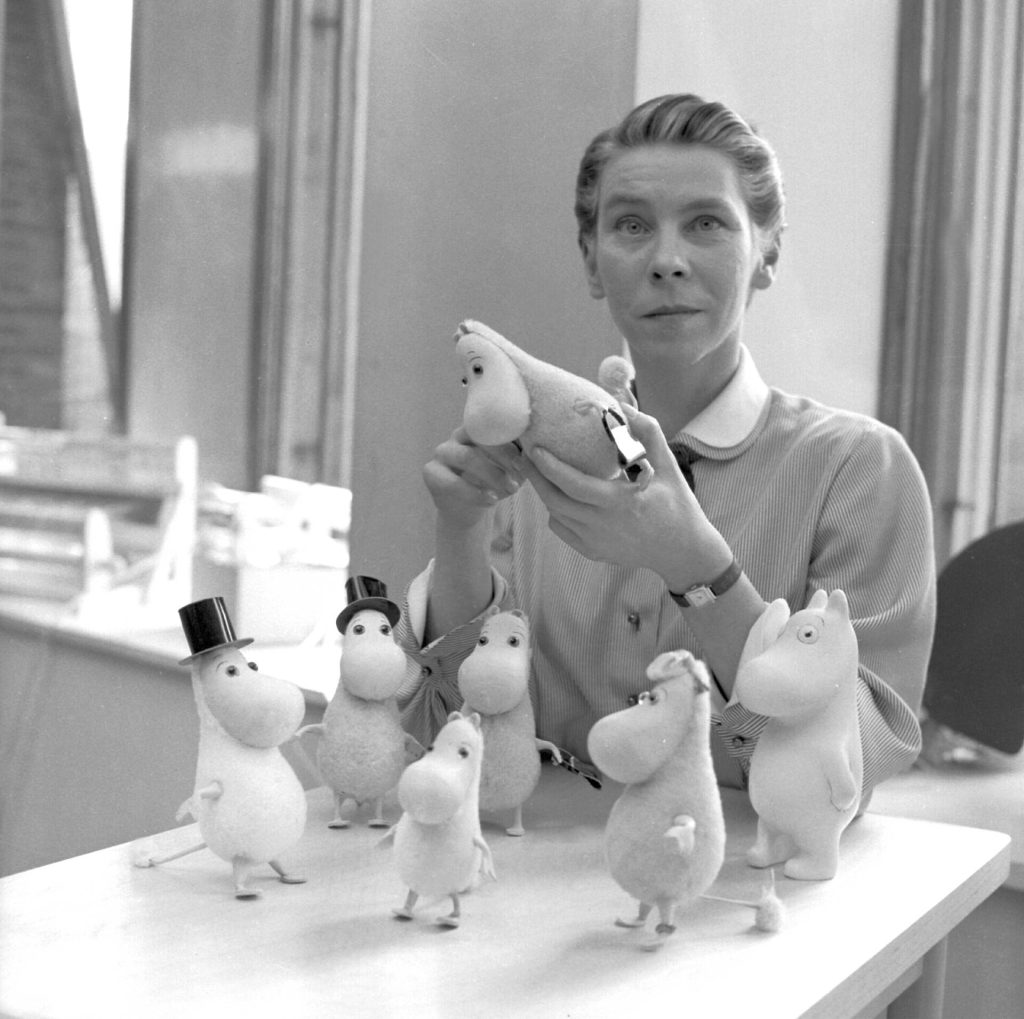 Tove Jansson and friends.
Tove Jansson and friends.
Jansson (who died in 2001) was a Finnish artist and writer who is probably best known (outside of Scandinavia, anyway) for the eight “Moomin” children’s fantasies she wrote beginning in the mid-1940’s and ending with the last volume in 1970. Set in Moominland and featuring the Moomin family and their eccentric friends (Moomins look sort of like hippos, or ambulatory marshmallows), the books are whimsical, dreamlike, gentle, satirical and sinister, all at the same time. I only recently discovered them, and I find them disquieting and delightful, which is one of the best combinations going.
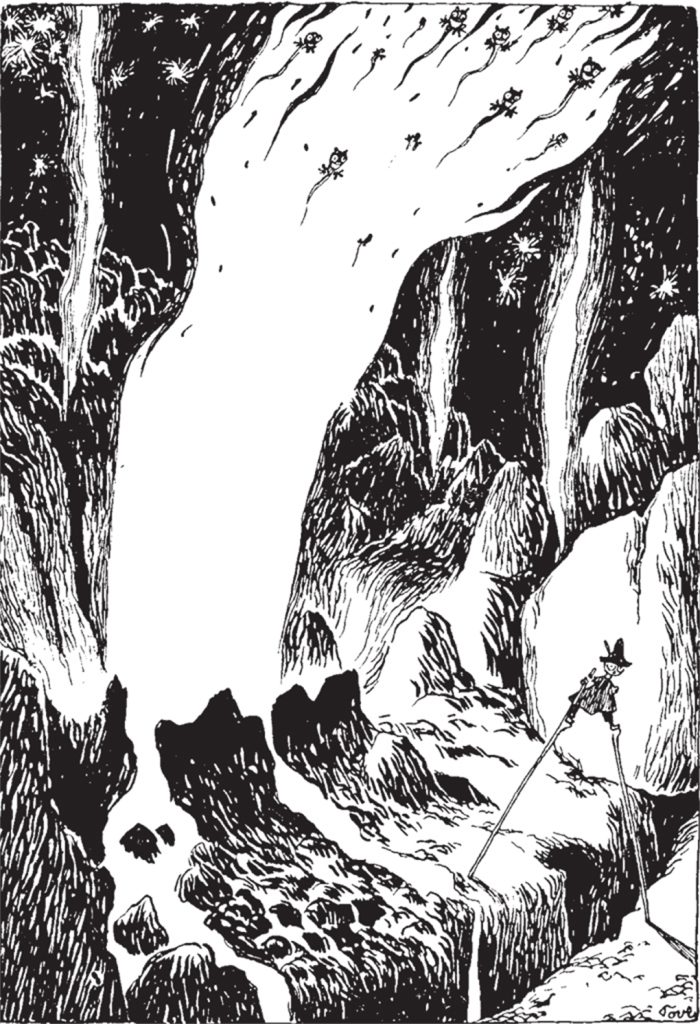 From Comet in Moominland. ©the estate of Tove Jansson
From Comet in Moominland. ©the estate of Tove Jansson
Jansson illustrated the Moomin stories herself, and her pen-and-ink drawings are some of the best things about the books. The illustrations for the first book in the series, Comet in Moominland, are especially striking; some of them are a cross between a kind of nightmare Lovecraftian landscape and the surreal imagery of William Hope Hodgson’s The Night Land.
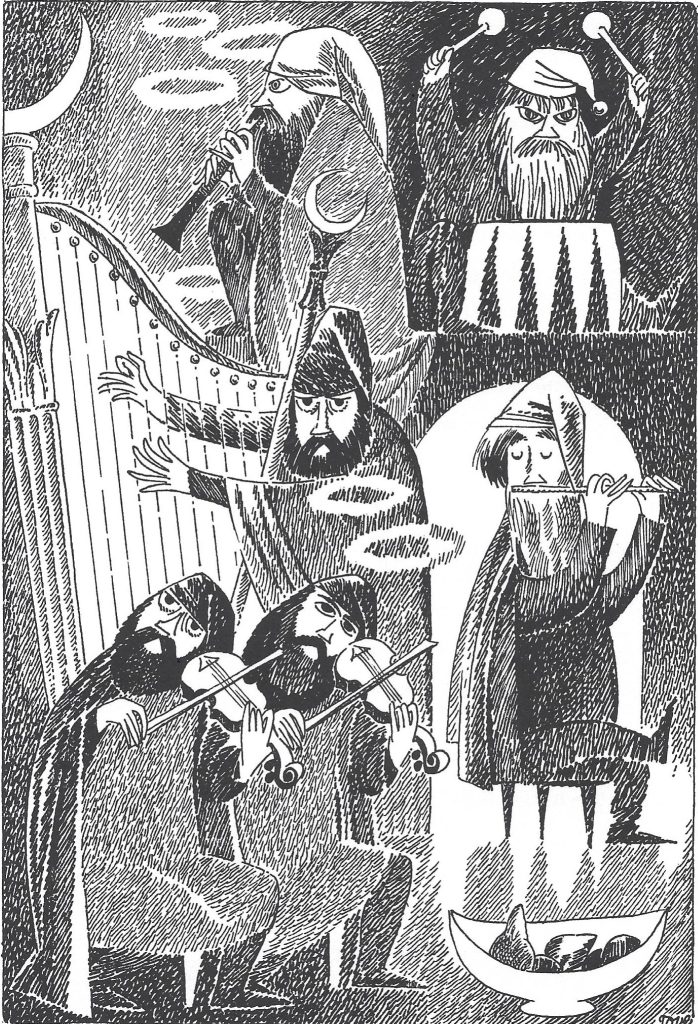 The Dwarves. ©the estate of Tove Jansson
The Dwarves. ©the estate of Tove Jansson
Though I’ve steadily been working my way through the Moomin books, I wasn’t aware until I had the Finnish Hobitti in my hands that Jansson had illustrated anyone else’s work. One look at her gorgeous cover illustration made me glad that she did. (There will always be a special place in my heart for a rampaging dragon.)
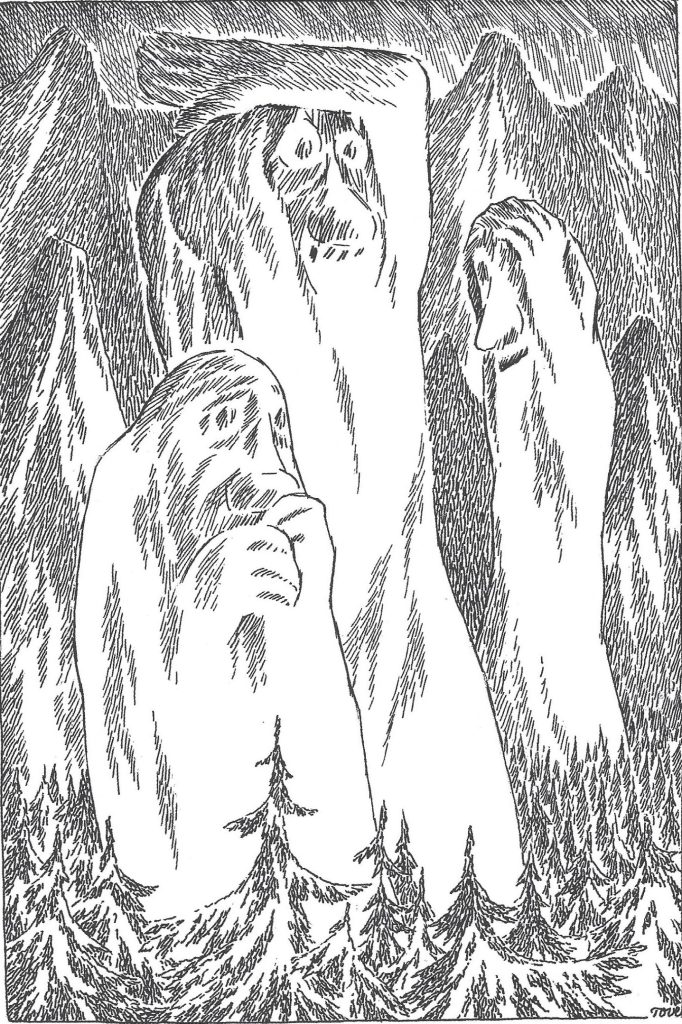 The Trolls. ©the estate of Tove Jansson
The Trolls. ©the estate of Tove Jansson
Jansson did her Hobbit illustrations for a 1962 Swedish edition (she was a member of Finland’s Swedish-speaking minority community) and they are refreshingly different from the more realistic renderings of Middle-earth and its inhabitants that are common today. She did twelve full-page black-and-white drawings for the book, another ten that cover half to a third of a page, and many smaller drawings that decorate the beginning or end of chapters.
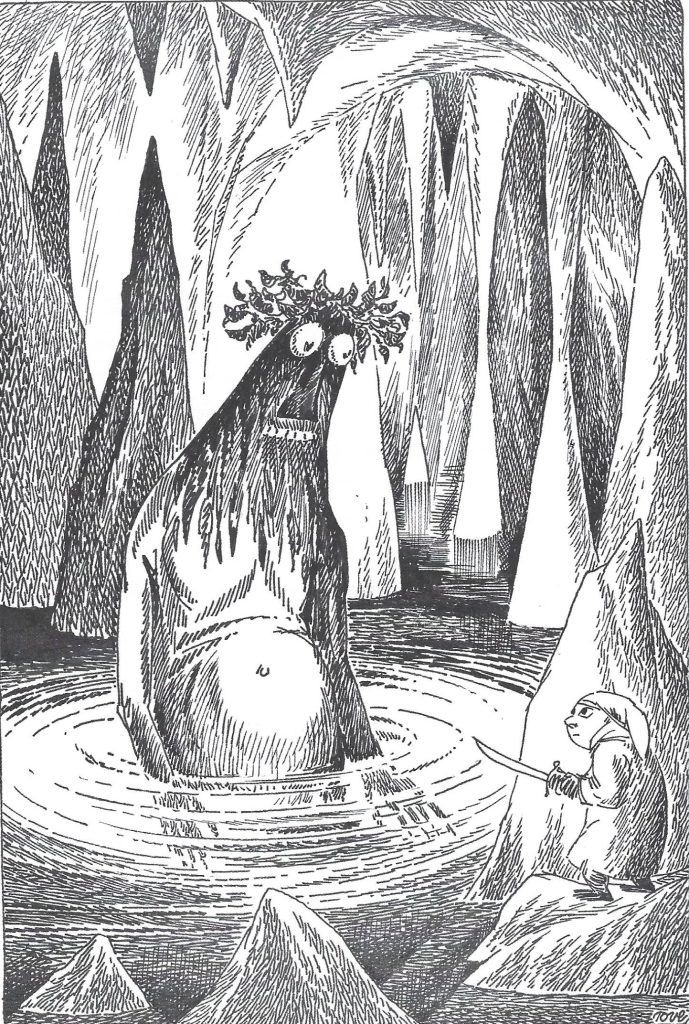 Bilbo and Gollum. ©the estate of Tove Jansson
Bilbo and Gollum. ©the estate of Tove Jansson
One thing that will immediately stand out to any Tolkien lover who flips through Jansson’s Hobitti is her visualization of Gollum. In Jansson’s drawings he’s huge, towering over Bilbo, and when Tolkien saw these illustrations, he supposedly realized that he had never specified exactly how large the slimy creature was, and so made the appropriate corrections for the Hobbit’s next edition, cutting Bilbo’s antagonist down to size.
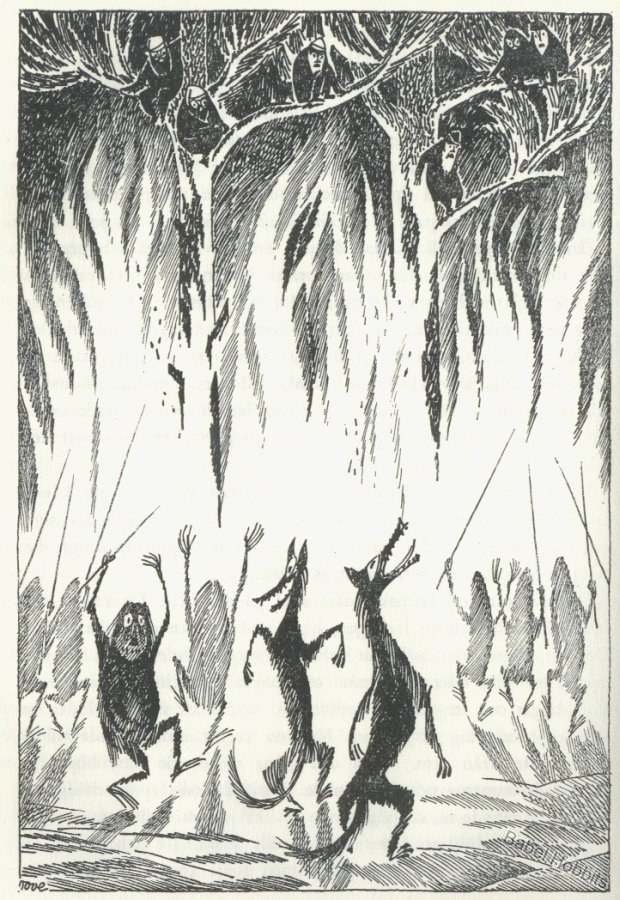 The Wargs. ©the estate of Tove Jansson
The Wargs. ©the estate of Tove Jansson
Jansson’s Tolkien illustrations are all her own; they’re not like any other rendition of Middle-earth that I can think of, and in comparing these wonderful pictures with more current ones, you can glimpse an older tradition, one that has its roots in the “North” that Tolkien loved, one that goes back to the sagas and Norse eddas that gave him his inspiration.
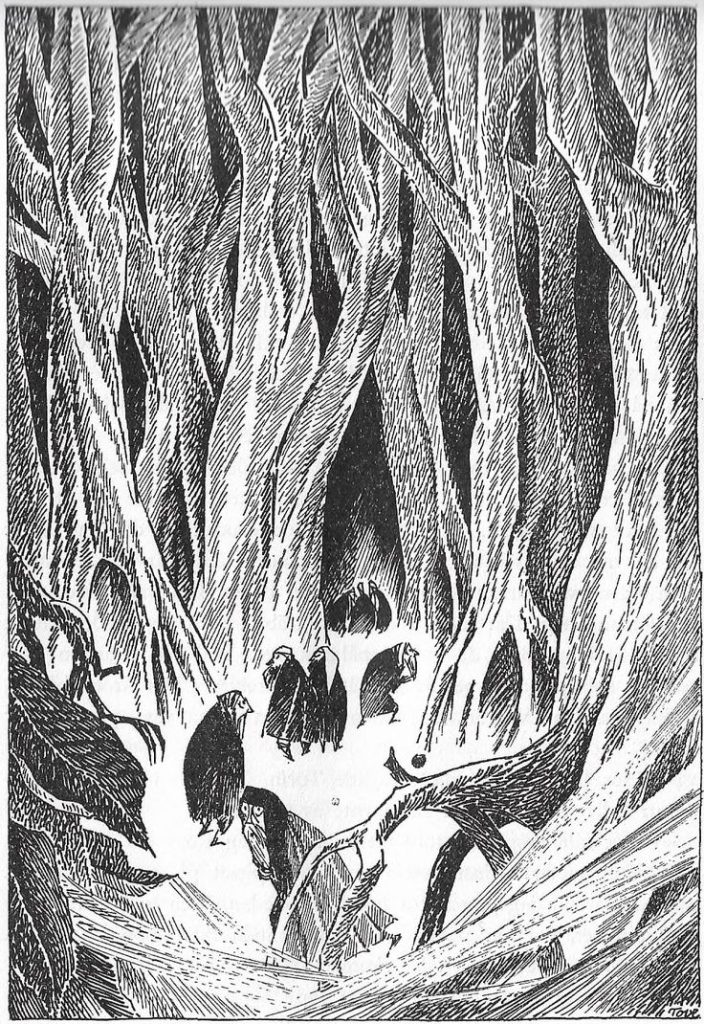 Mirkwood. ©the estate of Tove Jansson
Mirkwood. ©the estate of Tove Jansson
These simple-looking illustrations may not be to the taste of folks raised on fantasy photorealism (of course, in the hands of a true artist, there are few things deeper and more nuanced than simplicity), but I love them; their bold, expressionist lines combine the weird and the whimsical, the humorous and the beautiful, all with echoes of the heroic and the epic. I think Tove Jansson was a perfect match for Tolkien and his world.
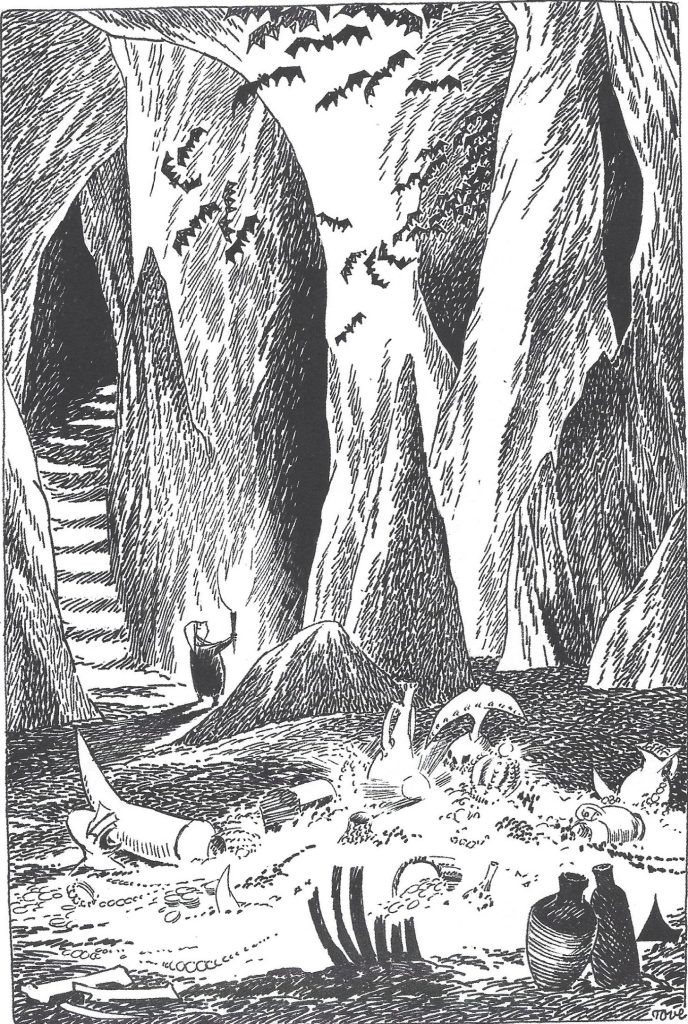 Smaug’s Treasure. ©the estate of Tove Jansson
Smaug’s Treasure. ©the estate of Tove Jansson
Just the other day I found out that Jansson did illustrations for Lewis Carrol’s Alice’s Adventures in Wonderland; NYRB Classics has just published a new edition featuring her drawings. Seeing what sparks Carrol’s story struck from Jansson is a rabbit hole I can’t wait to go down.
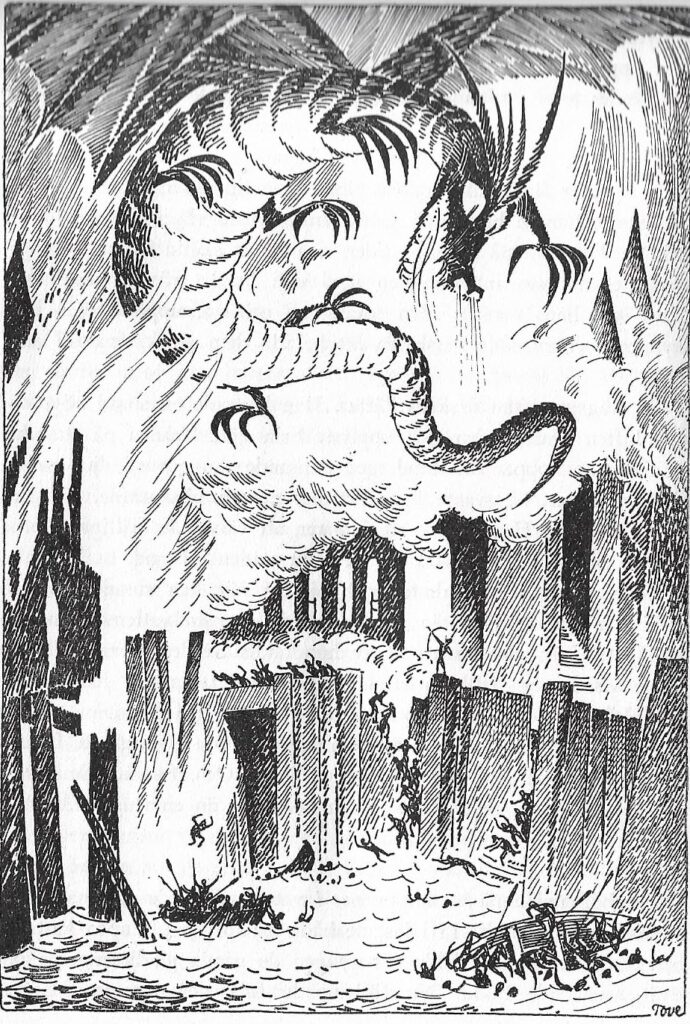 Smaug destroys Lake-Town. ©the estate of Tove Jansson
Smaug destroys Lake-Town. ©the estate of Tove Jansson
Until I can report back on Jansson’s Alice, I commend her Hobitti to you (her Moomin books, too), and I leave you with this:
Kaikki asekuntoiset ihmismiehet ja suurin osa haltiakuninkaan joukoista valmistautuivat marssimaan pohjoiseen Vuorta kohti. (What does that mean? I dunno, but it comes at the end of chapter Tulta Ja Vettä.)
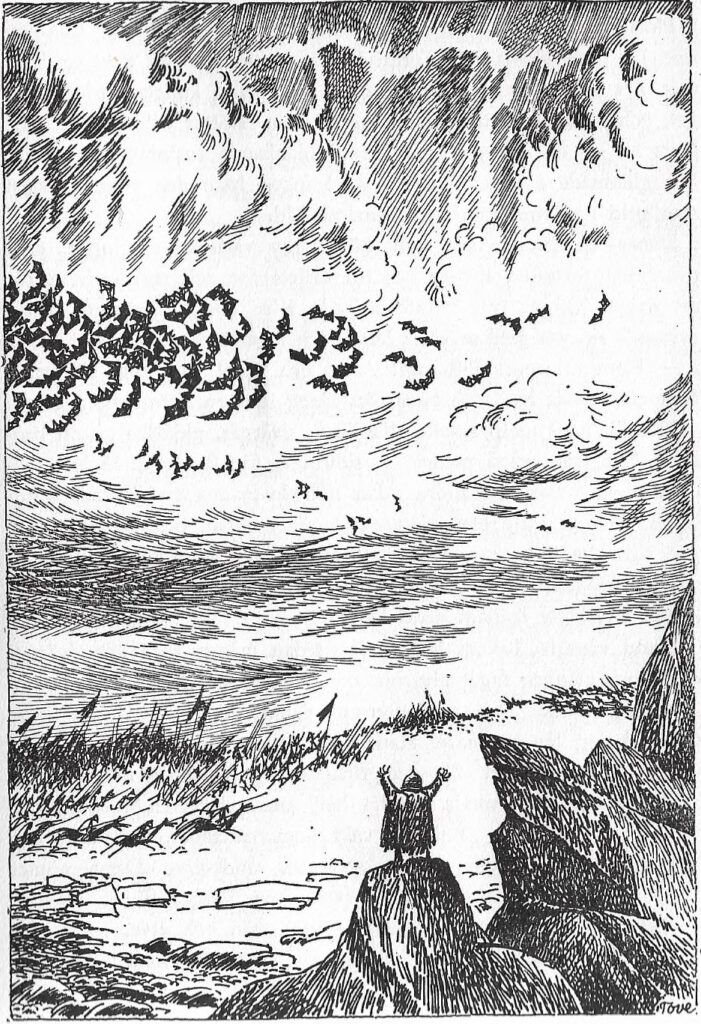 The Battle of Five Armies. ©the estate of Tove Jansson
The Battle of Five Armies. ©the estate of Tove Jansson
Thomas Parker is a native Southern Californian and a lifelong science fiction, fantasy, and mystery fan. When not corrupting the next generation as a fourth grade teacher, he collects Roger Corman movies, Silver Age comic books, Ace doubles, and despairing looks from his wife. His last article for us was The Lost World
7 Author Shoutouts | Authors We Love To Recommend
Here are 7 Author Shoutouts for this week. Find your favorite author or discover an…
The post 7 Author Shoutouts | Authors We Love To Recommend appeared first on LitStack.
Review: The Incandescent by Emily Tesh

Buy The Incandescent FORMAT/INFO: The Incandescent was published by Tor Books on May 13th, 2025. It is 432 pages long and is available in hardcover, ebook, and audiobook formats.
OVERVIEW/ANALYSIS: As the Director of Magic at Chetwood Academy, one of the most prestigious boarding schools in England, Dr. Walden's day is full of everything from faculty meetings to demons trying to break through the school's wards. She is constantly torn between keeping up on mundane admin while trying to stop idiot teenagers from messing with magic beyond their capabilities. But what is Dr. Walden to do when the greatest threat to the school might be herself?
The Incandescent is a fresh spin on the magical academia genre, where the overworked, underpaid faculty at an elite boarding school get to shine front and center. Nearly, if not all, magical academia books I have read have been from the POV of the students. I've seen plenty of books where a group of scrappy teenagers discovers a dark conspiracy afoot at their school. They sneak behind teachers' backs, dabble in a bit of forbidden magic or research, and generally defy authority, all in the name of saving the day.
But let's face it, many teenagers aren't noble heroes on a quest - they're idiots. Enter the exasperated staff of Chetwood Academy, trying to help shape students on their quest to discover their path in life, while also making sure they don't fall prey to demonic possession because they cut corners while drawing a summoning diagram. Dr. Walden and her staff are just as often trying to save the students from themselves as much as from outside threats, all while grading papers, offering career counseling, and managing the school's budget.
The Incandescent also takes a moment to examine and critique the whole structure of elitist boarding school culture. It examines the notion that what parents aren't paying for isn't really a top tier education; they're paying for their child to join the network of alumni scattered across the country and use that network for the rest of their lives. It's the social connections that truly matter to most parents, the security of knowing their child will have plenty of contacts who will open doors for them in the future. This in turn perpetuates systemic class disparities, as most often only those who can pay for the connections, get the connections.
I want to take a moment to note that while the marketing for this book makes a point of mentioning this is a sapphic story, you shouldn't expect a sweeping romance. Relationships are just one part of Dr. Walden's life, and certainly not the focus - which is good, because I found those romance dynamics one of the weaker parts of the story. On the one hand, I liked that Dr. Walden is grappling with the complications of juggling potential romance with the demands of her career. But there was just no chemistry between Dr. Walden and her love interest, leaving not particularly interested in what happened on that front.
CONCLUSION: The Incandescent is a worthy addition to the shelves of magical academia, and any fan of the genre should give it a read. It examines school culture from the rare perspective of the teacher, but it doesn't put forth that the teachers have all the answers; one of the best scenes is a student who challenges Dr. Walden's notion of how well their life situation and an elite boarding school education track go together. It gives you food for thought while also being an entertaining blend of school exams and demonic invasions, making The Incandescent a definite recommend.
Review of The Knight and the Moth by Rachel Gillig
As a Bookshop affiliate, I earn from qualifying purchases. The Knight and the Moth is the first book in The Stonewater Kingdom, a new gothic/romantic fantasy series by New York Times bestselling author Rachel Gillig. This was one of my most anticipated books of 2025 because One Dark Window, the author’s debut novel and the first book in The Shepherd King duology, was a fun, difficult-to-put-down story—and, as such, was one of my favorite books of 2022. Unfortunately, I was […]
The post Review of The Knight and the Moth by Rachel Gillig first appeared on Fantasy Cafe.Nosferatu: Was It the Time Change What Killed The Beast?
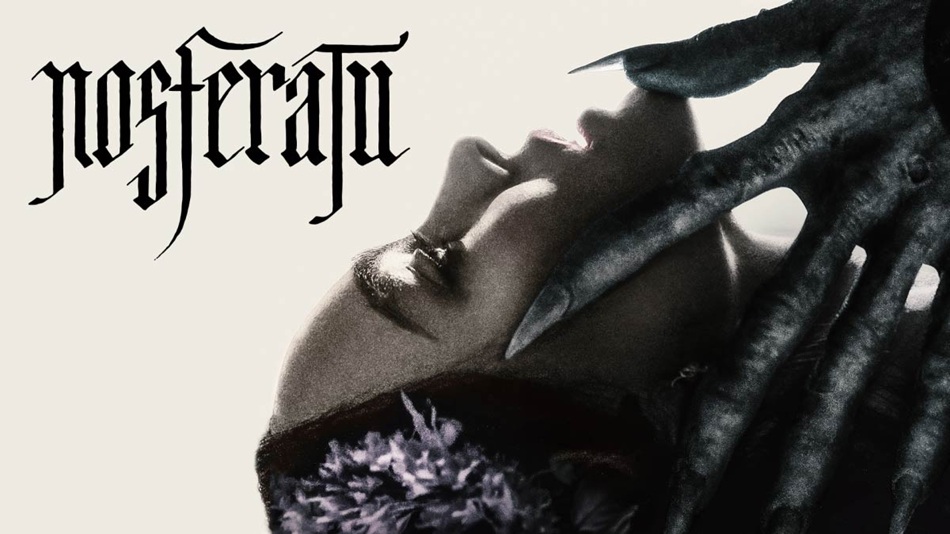 Nosferatu, written and directed by Robert Eggers, based on Nosferatu: A Symphony of Horror (1922), written by Henrik Galeen, and Dracula, penned by Bram Stoker in 1897.
Reboots and Adaptations
Nosferatu, written and directed by Robert Eggers, based on Nosferatu: A Symphony of Horror (1922), written by Henrik Galeen, and Dracula, penned by Bram Stoker in 1897.
Reboots and Adaptations
Okay. So I finally got around to watching Eggers’ version of FW Murnau’s classic from 1922, Nosferatu: A Symphony of Horror. By now, I think everyone knows the story behind FW Murnau’s Nosferatu, but here’s a brief summary: Murnau’s Nosferatu was an unauthorized adaptation of Bram Stoker’s Dracula, changing character names and locations but retaining the core plot elements. The film, which originally claimed to be adapted from Stoker’s novel, was made to avoid copyright issues and was eventually subject to legal action that nearly destroyed all prints.
Despite the name changes and some alterations, the film’s narrative largely follows Dracula’s journey, with the protagonist, Count Orlok (instead of Dracula), traveling to a new land — Romania to Germany, instead of Transylvania to England — and spreading a plague. Eggers’ reboot is definitely well made and impressive, and it has an other-worldly feel to it. It’s different from other vampire films. That being said, the original silent version is way creepier.
Now, allow me to digress for a paragraph or so. In 1979, there was a remake of the film — Nosferatu the Vampyre, known in Germany as Nosferatu: Phantom of the Night — directed by Werner Herzog and starring Klaus Kinski as Count Dracula. Yes, all Stoker’s character names were used in this film version. Not a bad film, but a bit anemic, you should pardon the pun. There’s also a fun flick from 2000 called Shadow of the Vampire, a fictional telling of the making of the silent Nosferatu, in which Willem Dafoe (who also has a role in Eggers’ version) stars as Max Schreck, the real name of the actor who first played Nosferatu. The twist is this: Max Schreck is a real vampire — a vampire playing a human actor who’s playing a vampire. (Sort of a Victor/Victoria, with blood.) Now where was I? Oh, yeah.
Expect SexFirst off… yes, sex is at the heart of Eggers’ Nosferatu. Sex is at the heart of Stoker’s novel, which was written in the sexually repressed Victorian Era. Sex plays a part in almost every vampire film I’ve ever seen. Francis Ford Coppola’s Bram Stoker’s Dracula (1992), for example, is loaded with sex and nudity, like the Three Brides feeding on Keanu Reeves, one of whom is Monica Bellucci. There’s also a wild scene between Dracula (Gary Oldman), in wolf manifestation, humping Lucy Westenra (Sadie Frost.) Then there’s the love scene between Mina Harker (Winona Ryder) and Dracula, where she licks his blood off his chest.
So there’s nothing new on the sexual theme and subtext of this latest version of Nosferatu. In fact, Nosferatu owes a lot to Coppola’s Dracula, a film I am quite fond of, in spite of some cringe-worthy acting, dialog and miscasting. Gary Oldman was fantastic; he owns that role and that film, just as Lily-Rose Depp, the real star of Nosferatu, owns this film. I’ll come back to her.
AtmosphereEggers’ Nosferatu owes a lot to Coppola’s Dracula in its use of shadows and some “camera tricks.” It also boasts some exquisite scenery and set design, which convey the ideal atmosphere for the story. The cinematography by Jarin Blaschke is masterful, the film score by Robin Carolan is spot on, and there are some haunting audio FX that add to the grimness of this film. The script pretty much follows the plot of the original screenplay by Henrik Galeen, but doesn’t owe much to Bram Stoker, other than his novel being the inspiration for the original, silent film.
I found this extended version to be a bit — (a bite?) — too long (in the tooth?) because it was almost deadly-dull at times. It moved as slowly as a corpse first waking up as one of the Walking Dead. The film spent too much time on mood and set up, and the first two acts I found to be somewhat tedious and boring. Not enough was happening! I did not find it at all exciting. It was like watching a pair of heroin addicts playing chess. The third act picked up some energy, but by then I was yawning. The plague of rats was pretty cool, though. There are a lot of rats in this film. I mean, a lot of rats.
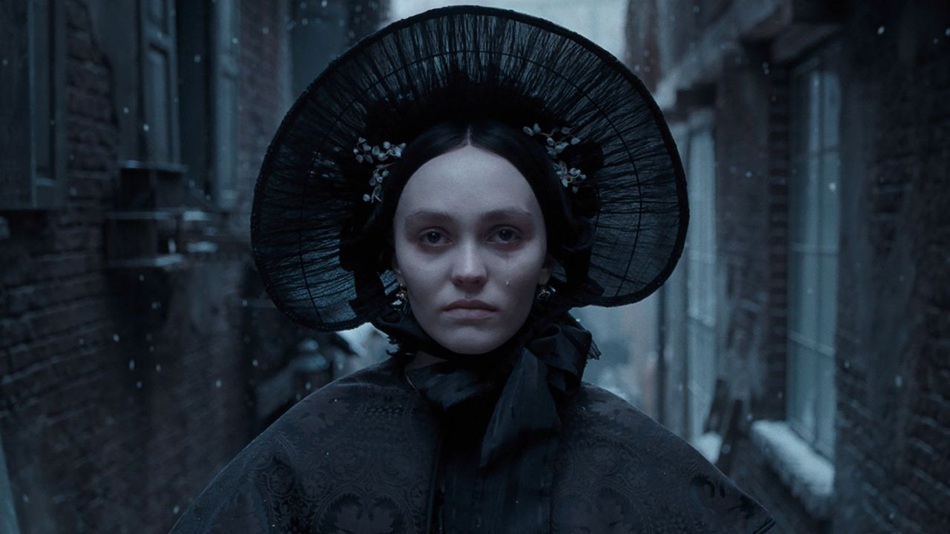 Lily Rose from Nosferatu 2024
Casting
Lily Rose from Nosferatu 2024
Casting
The cast was capable but not exceptional. They did their jobs and they did well enough. Willem Dafoe did a stand-up job, however, and in only one brief scene does he go over the top. I just couldn’t get emotionally attached or involved with any of the characters — except for Lily-Rose Depp. This is her film and she totally owns it. Her performance as Ellen Hutter (Mina Harker, in Stoker’s novel) is powerful and spot-on in every scene. She nails it and steals the show. She is put through the emotional ringer in this film — loving, angelic, quirky, possessed, demonic — you name it, she throws it all up there on the screen. She blew me away with a solid, heroic performance that was never over-the-top. She was brilliant. Her self-sacrifice in the final act is a powerful scene, and a sad one, as well.
As for the two kids who play the children of Anna Harding and Frederich Harding (Emma Corrin and Aaron Taylor-Johnson) I found them to be as annoying as a blister on the tip of my big toe, and when Nosferatu feeds on them, I cheered him on. It’s a brief, darkly-lit scene that quickly shift’s to Anna who sees her children being devoured, and the look on her face and her scream of horror, followed by her final fate, is chilling. That was a good bit. As for Bill Skarsgård, the other major player in Nosferatu and the title character…
I’m a fan. I’ve enjoyed his work in such films as John Wick, The Crow, and as Pennywise in the theatrical version of Stephen King’s IT — a feat of acting that, considering Tim Curry’s wonderful Pennywise, I applauded because he made the role his own: his Pennywise was the only good thing about that version of King’s novel.
But as for his take as Nosferatu… it didn’t work for me at all. I did not care for the make-up or the way he portrayed the character. There was nothing “supernatural” about him. He was just a force of evil, more like a big, hulking brute… and maybe that’s what Eggers wanted. I know The Last Voyage of the Demeter was not very well received, but I enjoyed that film and got a genuine sense of Dracula as being demonic, sorcerous, powerful, and evil. I didn’t get any sense of what Nosferatu felt for Ellen (Mina), no lost love, no real idea of why he wanted her, nothing about her being the reincarnation of a lost love. He says something about her not being of this world, of not being human or belonging to the living world — whatever. I must have missed something about how they were connected, but I’m not going back to “watch again,” at least not for the time being.
When Skarsgård’s dialog was in Romanian, it was subtitled in English. But when he spoke English, his accent was very difficult for me to understand. I was like, “What the hell is he talking about?” I kept expecting the villagers from Young Frankenstein to show up and shout in unison: WHAT?
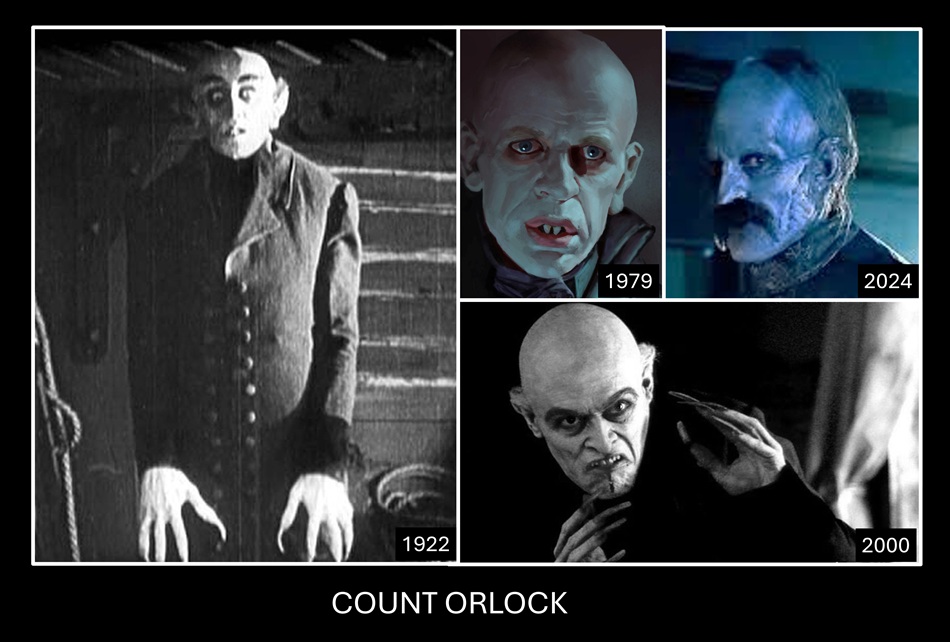 1922 MAX SCHRECK Nosferatu; 1979 KLAUS KINSKI Nosferatu the Vampyre; 2000 WILLEM DAFOE Shadow of the Vampire; 2024 Bill Skarsgård Nosferatu
Omnipotent Vampire Ignores Chicken, Dies
1922 MAX SCHRECK Nosferatu; 1979 KLAUS KINSKI Nosferatu the Vampyre; 2000 WILLEM DAFOE Shadow of the Vampire; 2024 Bill Skarsgård Nosferatu
Omnipotent Vampire Ignores Chicken, Dies
Now, here’s the problem I always had with the original version of Nosferatu, and with this one, too. I find it funny that an ancient, demonic, powerful vampire could become so besotted with blood and sex that he doesn’t see the sun rising and doesn’t pay attention to the cock’s first crowing. By the time of the second crowing, it’s too late. Didn’t he see or feel the sunlight shining through that honking-big window? Did he leave his watch at home? Did he forget about the time change? Or… maybe he knew that there was nowhere he could run and hide, because the coffin(s) full of his native soil had been destroyed. Or was this his fate, his desire — to perish in the arms of Ellen Hutter? I think that was it, because he could have let anyone destroy him at any time, if he wanted death and oblivion, but he wanted her to be his doom, he wanted to take her with him, to be with him forever in death. But what do I know? I’m not a real film critic. I’m just hear to entertain you Black Gate readers.
Check Out My DisappointmentI do not hate or dislike this version of Nosferatu. I am just disappointed in it. All the hype about this film, the word-of-mouth, gave me expectations of something I imagined would be a revelation, a landmark in moving pictures and vampire flicks in general. Thus, not getting what I expected, I was disappointed. It happens. And that’s on me. But if you haven’t seen the film, don’t let my review stop you from doing so. Check it out. You might like it. I’m sure I’ll watch the film again. Maybe it will grow on me. There are many favorite films I did not enjoy on first viewing, and vice versa, too. Anyway, Nosferatu was a big hit, it’s popular and made lots of $$$$$, so that should tell you something. One thing I do know… Lily-Rose Depp is going to have one helluva fine film career. I look forward to seeing her in more films.
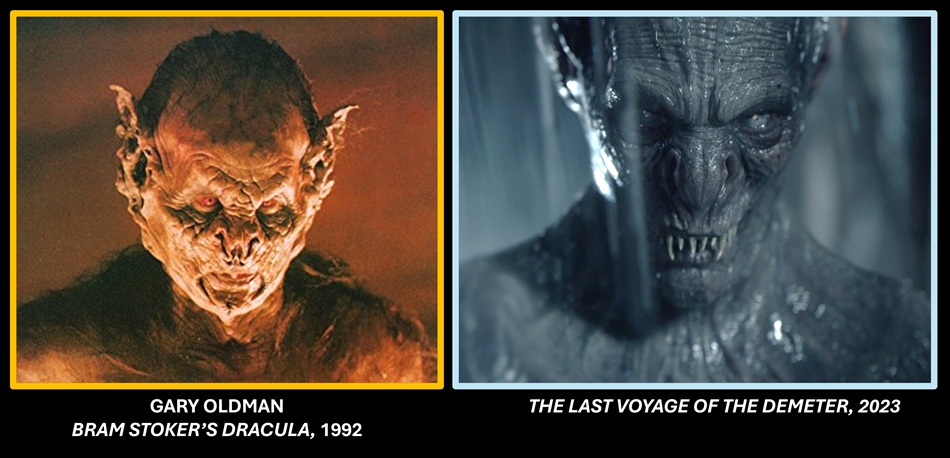 Left: GARY OLDMAN – BRAM STOKER’S DRACULA, 1992 Right: THE LAST VOYAGE OF THE DEMETER, 2023
Left: GARY OLDMAN – BRAM STOKER’S DRACULA, 1992 Right: THE LAST VOYAGE OF THE DEMETER, 2023
Joe Bonadonna is the author of the heroic fantasies Mad Shadows — Book One: The Weird Tales of Dorgo the Dowser(winner of the 2017 Golden Book Readers’ Choice Award for Fantasy); Mad Shadows — Book Two: The Order of the Serpent; Mad Shadows — Book Three: The Heroes of Echo Gate; the space operaThree Against the Stars and its sequel, the sword and planet space adventure, The MechMen of Canis-9; and the sword & sorcery pirate novel, Waters of Darkness, in collaboration with David C. Smith. With co-writer Erika M Szabo, he penned Three Ghosts in a Black Pumpkin (winner of the 2017 Golden Books Judge’s Choice Award for Children’s Fantasy), and its sequel, The Power of the Sapphire Wand.
He also has stories appearing in: Azieran: Artifacts and Relics; Savage Realms Monthly (March 2022); Griots 2: Sisters of the Spear; Heroika I: Dragon Eaters; Poets in Hell; Doctors in Hell; Pirates in Hell; Lovers in Hell; Mystics in Hell; Liars in Hell; Sinbad: The New Voyages, Volume 4; Unbreakable Ink; Poetry for Peace; the shared-world anthology Sha’Daa: Toys, in collaboration with author Shebat Legion; and with David C. Smith for the shared-universe anthology, The Lost Empire of Sol.
In addition to his fiction, Joe has written numerous articles, book reviews and author interviews for Black Gate online magazine.
If You Can’t Win, Bribe
Last night, in the middle of the tornado warning alert and our phones and our alarm system screaming in unison that a tornado is imminent:
Gordon: Is that a tornado siren of a flash flood siren?
Me: Who knows?
Kid 2. Kid 2 knows. They used to just do sirens for the tornados, but now they added flash floods, and so the tone of the siren is different. Apparently, that was the flash flood siren.
We’d managed to catch Batty, our outside cat, and secured her in the laundry room. The trust is broken again, and she will have to get over it for the next 6 months, but she didn’t fly into the storm. The tornado and hail missed us, so hey, it’s a good day. So on brand for Central Texas though. Any other day – sunny, hot, blue sky. Memorial and 4th of July – massive thunderstorm every year.
Gordon is recovering from surgery. We had to take the original bandage off and sealed the incision sites with waterproof bandages so he could take a shower, and his incisions are dry, the right color, and seem to be healing well. He can raise his arm all the way up, but the shoulder is still tight. He’s been going to physical therapy and his post-op is next week. Hopefully they will clear him for swimming, because that really seemed to help.
Yesterday Grace Draven came over before the storm, and we hung out and talked shop. I’m so excited for the new novella she is working on. It’s a brand new world and it is so shiny.
In other news, we are engaged in a tower-defense military campaign called, “Protect the bird feeder.” We both really like watching birds from the office window, so we set up a birdfeeder. We get all kind of birds and it’s awesome. We also get squirrels and the deer, who wreck the birdfeeder. The deer are the worst, so we now installed some strategic garden fencing around the bird feeder in concentric circles so they can’t step over it.
The squirrels are a bigger problem. Protecting against them is impossible so instead we settled for the misdirection.



Look how cute he is at his picnic table.
The post If You Can’t Win, Bribe first appeared on ILONA ANDREWS.
Heir of Light pub day!
“Measure of Devotion” Measuring an Outcome | Love, War, and Surrender
LitStack is excited to share Allie Coker’s review, an engaging exploration of the characters, key…
The post “Measure of Devotion” Measuring an Outcome | Love, War, and Surrender appeared first on LitStack.
Comment on A Judgement of Powers – US Cover Reveal by Brian
Looking forward to it!


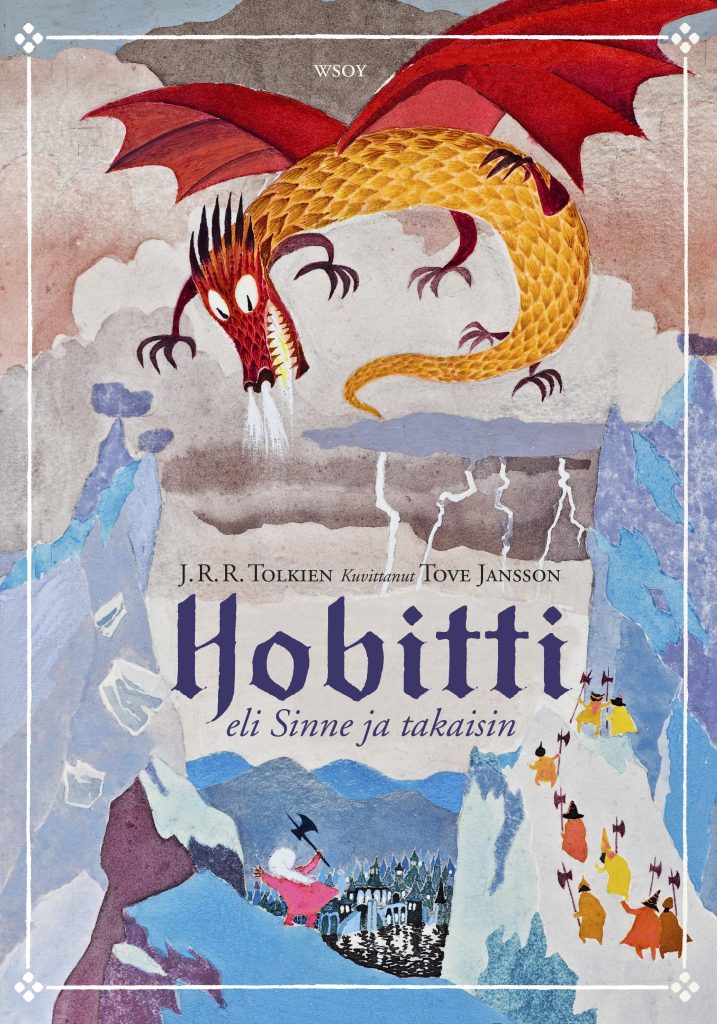
Recent comments